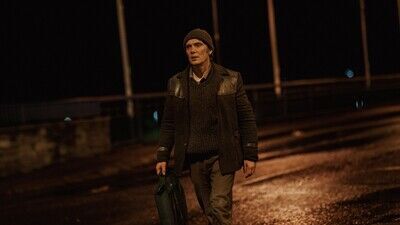Tim Mielants’ film is a haunting and meditative work, whose solemn rhythms mark a tantalizing first hour. Through effortless intercutting, we flashback to a young Bill living with his single mother on the farm of her employer and then come back forward to the present slumped shoulder manual laborer. The director and his DP Frank van den Eeden’s opaque compositions — we see Bill through foggy car windows and enclosed distantly in door frames — tell us much about him: his quietness, his solitude and his singular morality. Though everyone knows the crimes happening at the convent, no one dares to rebel against the powerful sisters. Even when Bill tells his wife (Eileen Walsh), she pleads with him to let it lie. But Bill can’t, especially when he meets Sarah, one of the unwed mothers, freezing in a coal shed just outside of the church.
It’s a promising premise that loses some steam in the final half hour. This is a film that could stand to be ten minutes longer. Because unlike “God’s Creatures,” a contemporary Irish story similarly concerned with the misogyny of the church, the sisters here, especially Mother Schwester (Emily Watson), are only one note malevolent figures. Still, the dynamics of the town, told through a keen visual language, provide sharp context and necessary depth. Having Murphy helps too; here, he’s a kind of George Bailey figure whose generosity brings the spokes of this web together. Murphy knows the tiniest decision can change a scene; each deep breath he takes forms the bedrock of the film. Murphy sells the final grace note with boyhood wonder, killing the audience watching the impeccable “Small Things Like These” with kindness.
When we first glimpse Ms. Lia (Mzia Arabuli), a curt, retired history teacher at the heart of Levan Akin’s affecting “Crossing,” she’s striding grimly down the shoreline. She is heading toward a shack where one of her former students lives, in search of her transgender niece Tekla, who she hasn’t seen since the girl’s transphobic parents disowned her. While her pupil doesn’t have much information to offer, his ne’er-do-well brother Achi (Lucas Kankava), harboring dreams of leaving their tiny Georgian town for the big city, claims to have Tekla’s forwarding address leading to Istanbul, Turkey. He will help Ms. Lia if she’ll bring him with. Their unlikely partnership, born out of deep loneliness, gives “Crossing,” an aching story of regret, its steady, unassuming heartbeat.
